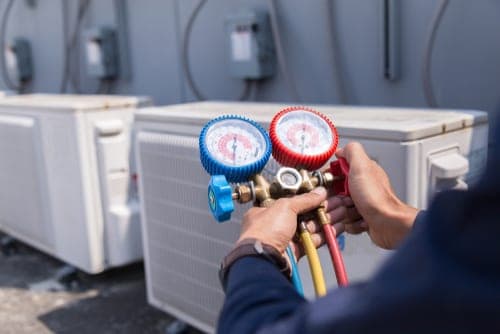Schedule Your HVAC Checkup Today with DMAKS HVAC Experts.
Wiki Article
Energy-Efficient Cooling And Heating Solutions to Save Money On Energy Costs
As power costs continue to rise, the significance of energy-efficient a/c systems becomes progressively apparent. These systems not only promise substantial financial savings on utility expenses however also add to an extra lasting future by lessening energy consumption. With different alternatives readily available, including geothermal warm pumps and ductless mini-splits, homeowner face a wide range of choices that can boost convenience and air high quality. However, comprehending the vital features and upkeep needs is crucial to making the most of these benefits. What aspects should be prioritized when picking the best system for your demands?Benefits of Energy-Efficient Heating And Cooling Equipments
Energy-efficient heating and cooling systems supply various advantages that expand beyond simple price savings. One considerable benefit is the decreased ecological impact. By taking in less power, these systems contribute to lower greenhouse gas discharges, aiding to battle climate modification and advertise sustainability. This lines up with increasing societal needs for environmentally friendly techniques in domestic and business setups.Additionally, energy-efficient HVAC systems commonly give boosted convenience degrees. Numerous of these systems feature advanced technology that enables far better temperature level control and boosted air high quality (DMAKS HVAC). This leads to a healthier indoor atmosphere, which is particularly important for individuals with allergic reactions or breathing issues
Furthermore, purchasing energy-efficient heating and cooling systems can enhance residential property worth. As even more consumers prioritize energy effectiveness, homes and structures equipped with these systems might attract higher bids in the realty market.
Kinds of Energy-Efficient Heating And Cooling Options
Exactly how can homeowners and companies select one of the most suitable energy-efficient HVAC options for their demands? The market provides a range of energy-efficient heating and cooling systems, each developed to boost comfort while decreasing power consumption.One option is the variable cooling agent circulation (VRF) system, which efficiently manages the temperature in multiple zones within a building. This system adjusts its cooling agent flow to match the desired temperature level, resulting in considerable power financial savings.
One more popular choice is geothermal heatpump, which utilize the earth's steady temperature level to warmth and great spaces. By moving warm to and from the ground, these systems demonstrate outstanding efficiency, especially in modest environments.
In addition, ductless mini-split systems provide an energy-efficient alternative for homes lacking ductwork. These systems enable zone-specific home heating and air conditioning, minimizing power waste in empty locations.
Last but not least, high-efficiency heaters and air conditioning unit, with advanced SEER and AFUE rankings, supply reputable climate control while taking in much less energy than typical versions. By assessing these alternatives, house owners and companies can select an a/c system customized to their specific requirements and power efficiency goals.
Trick Features to Consider

Next, examine the kind of compressor used in you could try these out the system. DMAKS HVAC. Variable-speed compressors can change their output to match the heating or cooling down demand, resulting in boosted convenience and energy savings compared to single-speed models. Additionally, seek systems outfitted with wise thermostats that use programmable settings and remote access, permitting much better control over energy consumption
One more crucial feature is the system's air filtration capacity. High-efficiency filters can improve interior air top quality and reduce power usage by guaranteeing the system runs successfully. In addition, take into consideration the sort of cooling agent utilized; modern-day systems usually utilize green refrigerants that have a lower ecological effect.
Finally, ensure that the system is compatible with zoning modern technology, which enables personalized temperature control in various locations of your home, enhancing convenience while decreasing energy usage.
Tips for Choosing the Right System


Next, take into consideration energy performance rankings, especially the Seasonal Energy Efficiency Proportion (SEER) for cooling systems and the Annual Fuel Application Efficiency (AFUE) for heater. Greater ratings indicate better efficiency, which can cause significant cost savings on energy bills in time.
Furthermore, examine the sort of a/c system that ideal matches your lifestyle and spending plan. Options consist of main air conditioning, ductless mini-splits, and warmth pumps, each with its very own set of benefits and downsides.
Don't overlook the relevance of proper installment and sizing; an inaccurately sized system can bring about ineffectiveness and increased wear. Seek advice from with an expert Cooling and heating specialist to acquire skilled referrals customized to your home's special needs. This detailed approach will ensure that you select an energy-efficient HVAC system that fulfills your needs and spending plan effectively.
Upkeep for Ideal Performance
Once the ideal cooling and heating system remains in place, ongoing upkeep ends up being crucial to guaranteeing optimum efficiency and long life. A properly maintained system runs more effectively, resulting in reduced energy intake and lowered utility expenses. Normal evaluations and tune-ups should be scheduled a minimum of twice a year-- as soon as before the air conditioning season and once before the heating period.
Property owners should also be attentive about checking their heating and cooling system's efficiency. Uncommon noises, fluctuating temperatures, or raised energy costs can show underlying concerns that call for immediate interest. By resolving these issues immediately, home owners can avoid pricey repairs and prolong the life-span of their systems.
Buying a maintenance strategy with a certified specialist not just boosts efficiency however additionally provides satisfaction, understanding that the system is running at its ideal. DMAKS HVAC. Normal maintenance is as a result essential for sustaining energy effectiveness and reducing general operational costs
Conclusion
To conclude, energy-efficient cooling and heating systems offer a practical option for minimizing energy expenses while improving comfort and air high quality. By integrating sophisticated modern technologies and alternatives such as geothermal warmth pumps and ductless mini-splits, residential or commercial property owners can accomplish considerable energy cost savings and contribute to ecological sustainability. Mindful factor to consider of system attributes and recurring upkeep additionally guarantees ideal performance, making energy-efficient systems a prudent financial investment for both financial and eco-friendly advantages.Report this wiki page